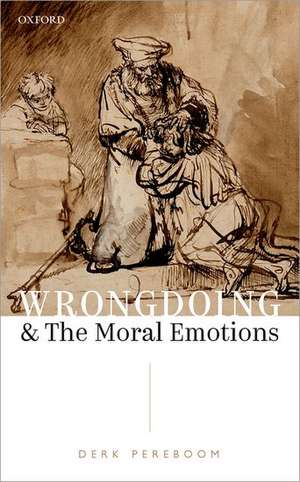Wrongdoing and the Moral Emotions
Autor Derk Pereboomen Limba Engleză Hardback – 5 aug 2021
| Toate formatele și edițiile | Preț | Express |
|---|---|---|
| Paperback (1) | 132.71 lei 11-16 zile | +40.68 lei 6-12 zile |
| OUP OXFORD – 26 oct 2023 | 132.71 lei 11-16 zile | +40.68 lei 6-12 zile |
| Hardback (1) | 242.89 lei 11-16 zile | |
| OUP OXFORD – 5 aug 2021 | 242.89 lei 11-16 zile |
Preț: 242.89 lei
Preț vechi: 254.34 lei
-5% Nou
Puncte Express: 364
Preț estimativ în valută:
46.48€ • 48.43$ • 38.48£
46.48€ • 48.43$ • 38.48£
Carte disponibilă
Livrare economică 03-08 martie
Preluare comenzi: 021 569.72.76
Specificații
ISBN-13: 9780192846006
ISBN-10: 0192846000
Pagini: 214
Dimensiuni: 142 x 223 x 16 mm
Greutate: 0.4 kg
Editura: OUP OXFORD
Colecția OUP Oxford
Locul publicării:Oxford, United Kingdom
ISBN-10: 0192846000
Pagini: 214
Dimensiuni: 142 x 223 x 16 mm
Greutate: 0.4 kg
Editura: OUP OXFORD
Colecția OUP Oxford
Locul publicării:Oxford, United Kingdom
Notă biografică
Derk Pereboom (Ph.D. UCLA) is the Susan Linn Sage Professor in the Philosophy Department at Cornell University and Senior Associate Dean for Arts and Humanities in Cornell's College of Arts and Sciences. His areas of research include free will and moral responsibility, philosophy of mind, and early modern philosophy, especially Kant. He is the author of Living without Free Will (Cambridge 2001), Consciousness and the Prospects of Physicalism (Oxford 2011), Free Will, Agency, and Meaning in Life (Oxford 2014). He has published articles on free will and moral responsibility, consciousness and physicalism, nonreductive materialism, and on Kant's metaphysics and epistemology.
Recenzii
In this book, Derk Pereboom provides further elaboration and defense of his long-standing vision of a world without retributivism ... The result is exactly what we have come to expect from Pereboom: a dialectically engaged, avowedly revisionist, humanely pursued vision of life after "basic desert" ... His claims and ideas will resonate further, interacting with a variety of thinkers from a broader swath of philosophy. I recommend it for those near and far.
This is a terrific book. It will be of serious interest to those working on free will and moral responsibility, those working on moral emotions, philosophers of religion, legal theorists interested in criminal responsibility and punishment, and ethicists working on defensive harm and war ethics among others. The book offers original and important contributions on topics in all of these areas, and they are unified by being parts of the exploration of the implications of free will skepticism and providing a coherent and mutually supporting picture what our emotional and ethical lives should be like.
In Wrongdoing and the Moral Emotions Pereboom offers a new and wide-ranging account of what remains when we reject the idea that people are at least sometimes - and in at least one important sense - morally responsible for what they do ... As always, Pereboom is inventive, nuanced, and scrupulously responsive to critics of his views. No book this radical in its aims can hope to secure widespread agreement, but it will undoubtedly be a landmark for future discussions of culpability, moral psychology, hope, and the philosophy of punishment.
This is a terrific book. It will be of serious interest to those working on free will and moral responsibility, those working on moral emotions, philosophers of religion, legal theorists interested in criminal responsibility and punishment, and ethicists working on defensive harm and war ethics among others. The book offers original and important contributions on topics in all of these areas, and they are unified by being parts of the exploration of the implications of free will skepticism and providing a coherent and mutually supporting picture what our emotional and ethical lives should be like.
In Wrongdoing and the Moral Emotions Pereboom offers a new and wide-ranging account of what remains when we reject the idea that people are at least sometimes - and in at least one important sense - morally responsible for what they do ... As always, Pereboom is inventive, nuanced, and scrupulously responsive to critics of his views. No book this radical in its aims can hope to secure widespread agreement, but it will undoubtedly be a landmark for future discussions of culpability, moral psychology, hope, and the philosophy of punishment.
